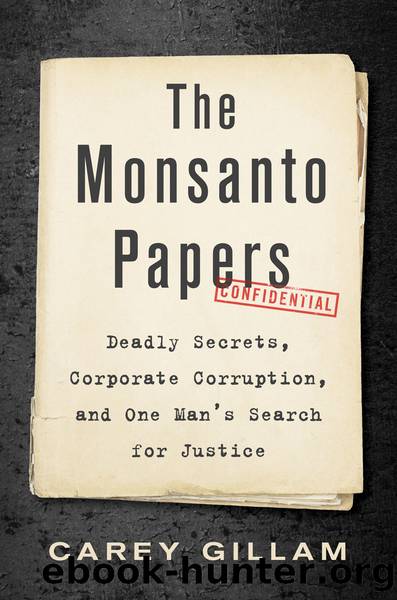The Monsanto Papers by Carey Gillam

Author:Carey Gillam
Language: eng
Format: epub
Publisher: Island Press
Published: 2021-03-15T00:00:00+00:00
CHAPTER 11
A Question of Science
While Tim was focused on Leeâs upcoming trial, Brent, Aimee, and the other members of the litigation leadership team had a very different focus. They were battling to keep hundreds of their cases alive.
Judge Vince Chhabria had ordered what he referred to as âscience week,â several daylong sessions in which the lawyers for both sides would put the best experts they could find on the stand in Chhabriaâs courtroom to testify about how scientific studies did or did not show links between Monsantoâs products and cancer. If Chhabria found any of the expert opinions to be flimsy, he could ban their testimony at trial. Because the burden of proof would rest with the plaintiffs, expert testimony was especially critical for their side. The plaintiffsâ lawyers knew they would have virtually no chance of winning if jurors didnât hear from multiple experts who could explain the scientific studies showing that Roundup exposure caused non-Hodgkin lymphoma.
These Daubert hearings, as the legal community called them, were named after a precedent-setting case from 1993. Daubert v. Merrell Dow Pharmaceuticals, Inc. was brought by parents whose baby suffered severe birth defects after the mother took an anti-nausea medication called Bendectin, made by Merrell Dow and prescribed for pregnant women. Hundreds of lawsuits were filed against the company, which eventually pulled the drug off the market. But it was the Daubertsâ case that led to a US Supreme Court ruling declaring that when scientific testimony is offered, it must first be assessed by a judge to determine whether or not the testimony is based on valid scientific methodology. The ruling called for judges to be gatekeepers, protecting jurors from shady lawyers who might use disreputable witnesses to try to present unvalidated junk science as evidence. But having a judge, who specialized in law and not science, determine what is or is not scientifically valid, could be dicey, the lawyers knew.
There were more than three hundred lawsuits consolidated in Chhabriaâs court by that time, and although some plaintiffs were in remission, others were suffering and dying from their cancers. It was up to Aimee, Mike Miller, and the rest of the team to make sure their cases stayed alive. The experts they had hired would be relied on not only for the cases going through federal court but also for most of the cases pending in state courts around the country.
It had not been easy finding scientists with both the expertise and the gumption needed to go up against Monsanto. But Aimee, Mike, and the others were thrilled with the experts they had managed to secure. One of their most important experts was Beate Ritz, chair of the epidemiology department at the University of California, Los Angeles, whose work focused on studying pesticide exposures and disease. Another key expert for their case was Dennis Weisenburger, chair of the pathology department of the City of Hope Medical Center in Omaha, Nebraska. Weisenburger specialized in the study of non-Hodgkin lymphoma, which made his testimony about links between the disease and Roundup essential.
Download
This site does not store any files on its server. We only index and link to content provided by other sites. Please contact the content providers to delete copyright contents if any and email us, we'll remove relevant links or contents immediately.
Inner Engineering: A Yogi's Guide to Joy by Sadhguru(6785)
The Power of Now: A Guide to Spiritual Enlightenment by Eckhart Tolle(5746)
Fear by Osho(4727)
Ikigai by Héctor García & Francesc Miralles(4238)
The Art of Happiness by The Dalai Lama(4122)
The Ultimate Bodybuilding Cookbook by Kendall Lou Schmidt(3934)
Yoga Therapy by Mark Stephens(3742)
The Little Book of Hygge by Meik Wiking(3679)
The Healing Self by Deepak Chopra(3568)
Why Buddhism is True by Robert Wright(3446)
The Hatha Yoga Pradipika (Translated) by Svatmarama(3318)
Being Aware of Being Aware by Rupert Spira(3272)
Shift into Freedom by Loch Kelly(3192)
Wild Words from Wild Women by Stephens Autumn(3147)
Work Clean by Dan Charnas(3114)
Happiness by Matthieu Ricard(3040)
More Language of Letting Go: 366 New Daily Meditations by Melody Beattie(3017)
Yoga Body & Mind Handbook by Jasmine Tarkeshi(2870)
Why I Am Not a Feminist by Jessa Crispin(2746)
